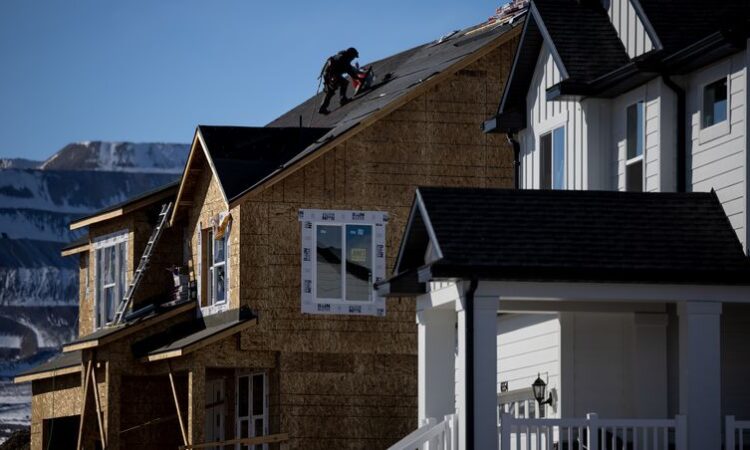U.S. housing market hits record $47 trillion in value. Millennial homeowners gained the most

Even though the U.S. housing market continues to be comparably sluggish amid interest rates now hovering close to 7%, the total worth of U.S. homes neared a record $47 trillion in June, erasing the almost $3 trillion it lost during the recent slump.
That’s according to a new report by online real estate site Redfin, in which analysts wrote a shortage of homes has kept values high despite a new normal of high interest rates.
“Today’s housing market is unique because home values are at a record high even though demand is sluggish,” the report states. “Despite lukewarm demand, there aren’t enough homes to go around because so few homeowners are selling. This imbalance between supply and demand is keeping values afloat.”
The total worth of U.S. homes hit a record high of $46.8 trillion in June, surpassing the previous all-time high of $46.6 trillion set a year earlier, according to an analysis of Redfin’s estimated value of more than 90 million U.S. residential properties. The gains, up 19.1% ($7.5 trillion) from two years earlier, has now offset the $2.9 trillion decline in value that occurred from June 2022 through February 2023 due to rising mortgage rates.
Related
“The dominance of the 30-year fixed rate mortgage in America is propping up home values,” said Chen Zhao, who leads Redfin’s economics team. “Tons of homeowners scored an incredible deal during the pandemic: a 3% mortgage rate for the remainder of their 30-year loan. Now they’re staying put because moving would mean taking on a rate that’s twice as high. This means buyers who are in the market now are duking it out for a very small pool of homes, preventing home values from plunging.”
About 90% of homeowners with a mortgage have a rate under 6%, which is almost a full percentage point below today’s nearly 7% average, Redfin reported. As a result, only 1% of the nation’s homes have changed hands this year, the lowest share in at least 10 years. Meanwhile, the number of U.S. homes for sale dropped 15% year over year to an all-time low in June, the biggest annual decline in almost two years.
“The U.S. housing market has become a system of winners and losers,” Zhao said. “The winners are homeowners who bought before mortgage rates started rising; they continue to build equity even though homebuyer demand has slowed. The losers, sadly, tend to be first-time buyers. They’re entering the market at a time when it’s expensive to borrow money, home prices are near their record high, and there are very few houses to choose from.”
Who gained the most?
Millennial homeowners gained more value than any other generation in early 2023. The total value of U.S. homes owned by millennials rose almost 3% year over year to $5 trillion in the first quarter of the year — seeing the biggest increase compared to any other generation, Redfin reported.
Millennials have aged into the housing market while the Silent Generation — those born from 1928 to 1945 — have aged out, moved into retirement homes or died. It’s the second quarter in a row that millennials have held more value than the Silent Generation, according to Federal Reserve data.
“The value of homes owned by the Silent Generation fell 11.4% to $4.7 trillion. Meanwhile, the value of homes owned by Generation X dropped 0.7% to $13.4 trillion, and the value of homes owned by Baby Boomers was flat, at $18 trillion.”
Related
Even though millennials gained the most housing value during this time period — and now make up the largest share of homebuyers, having purchased about 60% of houses bought with mortgages over the last several years, according to Redfin — they’re still far behind the home values held by Gen X and Baby Boomers.
It’s worth noting, however, that millennials have actually lost home equity, declining 18.2% year over year in the first quarter. That’s the biggest decline of any other generation and it’s likely because they’re tapping into the home equity gained during the pandemic to pay off credit card debt, student loans or to finance home improvement projects, Zhao said.
Even though Millennials make up the largest share of homebuyers these days, that doesn’t mean they’re having an easy time. The Washington Post recently deemed them the “unluckiest generation,” having experienced the slowest economic growth of any generation while also being saddled with student debt, high child care costs and wages that haven’t kept pace with cost of living. Meanwhile, they’ve entered the housing market when prices have never been higher and availability so low.
Generation Z is also no exception. Those at the older end of Generation Z have started to enter the housing market as well, but many in their 20s are struggling to find a foothold, The New York Times detailed in a recent story titled “Gen Z Can’t Afford the Rent.” About one third of the generation’s adults live with their parents and plan on staying with them long-term, the Times reported.
A median-income household in the United States would need to spend more than 30 percent of its income for an average-priced apartment, according to a report from Moody’s Analytics. A household is considered cost-burdened — or house poor — when it spends more than 30% of its income on rent and utilities, according to the National Low Income Housing Coalition.
Related






